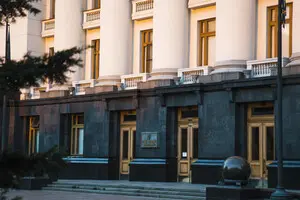Ukraine Needs Immediate Systemic Changes Instead of Imitation Reforms
The decision to liquidate the Medical and Social Expert Commission (MSEC) in response to the corruption discovered there has been adopted. And will similar decisions be made regarding the complete restart of the Prosecutor General's Office, the State Customs Service of Ukraine and the State Tax Service of Ukraine. Yes, I expect all that. And you know why?
Because, despite the fact that Mr. Danylo Hetmantsev says that we do not have systemic corruption in the tax office, business representatives have confirmation that it is there.
There is systemic corruption in the State Tax Service of Ukraine, the State Customs Service of Ukraine, and the General Prosecutor's Office of Ukraine. And the fact that it is in the Medical and Social Expert Commission, business representatives have been talking about for many months. They demonstrated it in polls and spoke directly. That is why we in the Coalition of Business Communities "For the Modernization of Ukraine" advocated transparent and understandable economic reservation of critical personnel. Not shady and illegal, made through the Medical and Social Expert Commission, but normal reservation of critical personnel, i.e. according to clear, economically justified rules.
However, it turns out that this shady "economic reservation" is beneficial to the state. We calculated what the state loses from this — and it is more than 1 billion euros per year. The head of the economic committee of the Verkhovna Rada of Ukraine, Dmytro Natalukha, has even more accurate statistics that the amount of corruption in this area is about UAH 80 billion per year. And this is almost 2 billion euros.
At the same time, the total corruption rent in the country is about 600 billion UAH. This is what the state should pay attention to. And not to engage in taking away tens of billions from business with the help of taxes, leaving hundreds of billions in corruption instruments. The conclusions are obvious and do not require additional explanations.
In other words, we have two options on the scales.
The first: save the system that gives 80 billion UAH of corruption rent and gives the opportunity to buy off the rich, destroys business and leads to the flourishing of corruption.
The second: implement our proposed critical personnel reservation system (which has been nicknamed "economic reservation", although in fact economic reservation already exists in the form of reservation for critical enterprises).
The proposed approach removes corruption and saves business and economic activity, allows us to strengthen recruiting and provision of our military. In addition, this approach is capable of bringing about UAH 250 billion to the state budget already in 2025.
And what does the state choose? Our country "thinks and consults" for months, and then makes an "unexpected" decision in favor of preserving the corrupt system and destroying the already functioning economic reservation system. Unfortunately, the state again reacts inadequately, namely it chooses to destroy business instead of destroying corruption schemes. And this is a completely illogical and wrong approach.
The state as the main factor of business instability
Another rhetorical question: why what is done by the state mainly has a negative effect on the business that works honestly, that is, on the business that strives to work according to the official rules of the game? This type of business suffers the most.
The businessman who did not give money to avoid military service, who went through the economic reservation procedures, is now suffering. For example, take a critical enterprise in the food industry or infrastructure, or in the defense industry — all of them are now unable to extend the economic reservation of personnel and eventually stop production.
And since the personnel of such an enterprise is registered in the reservation system, now information about all its members is available to the Territorial Center of Recruitment and Social Support (TCC) and for the possibility of their subsequent mobilization. Consequently, this honest and transparent business will now lose its critical personnel even more quickly due to mobilization.
The business constantly complains that if 50% of the employees are reserved according to the transparent type of economic reservation, then representatives of the Territorial Center of Recruitment and Social Support come to the representatives of such businesses and try to hand over summonses for military service to the remaining 50%. Or in some other way, entrepreneurs are forced to "solve the issue". The risk that "50%" will be halved in absolute terms with each new economic reservation forces entrepreneurs to look for options to continue to exist normally.
So, the more honest and decent a business is, the worse the state treats it. And the business that played against the rules — hid and avoided official procedures or bought itself off — it will buy itself off again and find a way to hide its unofficial employees.
Tell me why the state constantly fights with honest entrepreneurs, why not the other way around? According to the testimony of local entrepreneurs and representatives of the KOHA association, in Kharkiv, the pressure from the Territorial Center of Recruitment and Social Support on honest business has reached particularly catastrophic proportions.
Transparent economic reservation prevents corruption
No matter how wrong and complicated the critical enterprise reservation system was, it existed and allowed really critical enterprises to book important personnel. If you think that the system is imperfect, then you should understand why it is, verify it, check it, but not destroy it and that white, that is, honest business that used this system.
Or you should propose a new system and then gradually replace it with another, more reliable system. But there is no need to take these destructive steps, such as stopping the Diia portal, making it impossible to economically reserve critical personnel, or canceling this system altogether. One gets the impression that the state seems to be constantly looking for a tool to worsen business conditions.
All developed countries are struggling with the problem of how to attract more talents, entrepreneurs, investors, creating better stimulating conditions for business. In Ukraine, the state itself is a key obstacle to effective business. According to our latest research among businesses, it is not war, but the state and the risks it creates, that have already overtaken military risks.
That is why I never get tired of repeating that we need systemic changes. The fact that the state has for years chosen chaotic (demonstration) imprisonment of corrupt officials as a fight against corruption did not bring any major effective changes and does not bring. Thus, there will be no major changes in the General Prosecutor's Office of Ukraine, nor in the Medical and Social Expert Commission (MSEC), nor in the State Tax Service of Ukraine, nor in the State Customs Service of Ukraine.
Individuals caught red-handed and found with evidence of the crime, filmed and publicized with their incredible looted fortunes, are only the tip of the corruption iceberg. In conditions where the state worsens the conditions for effective business and at the same time maintains favorable rules for corrupt people, it is obvious that society will not be satisfied with the resignation of the general prosecutor, nor with formal criticism and the demand to reorganize the Medical and Social Expert Commission (MSEC).
Dismissing individual corrupt officials from their positions (even putting them in prison is not an option, because these are generally isolated cases) and at the same time not changing the corrupt system of the association itself. There is nothing funny about this.
Therefore, one should not try to change people in a false, distorted, inefficient system, one should correct or even completely change the system itself. Only systemic changes, which will be followed not just by the replacement of institutions, but by the creation and introduction of new rules of the game, will lead to real changes for the better.
Remember what happened with the Bureau of Economic Security of Ukraine, when the idea to introduce this institution was formed. The idea was very simple, namely to destroy the tax police and consolidate the economic investigation in a single body. And what did we get? The tax police simply moved to the Bureau of Economic Security of Ukraine with the same functions, views, models, approaches, and this, of course, did not solve anything in the country, but increased corruption and pressure on business, but on a new level.
Human capital is Ukraine's most valuable asset
Our most scarce resource right now is human capital. We have nowhere to take it and there is no way to restore it. Yes, our international partners will help us with weapons and money, but they will not help us with people.
Therefore, the main question is how to involve each person in the most effective way for the country. This is the key task of the state. And the state, on the other hand, drives people into the "shadow", squeezes talents out of the country.
Ultimately, this leads to unmotivated mobilization. This is when the commanders tell me that they cannot recruit servicemen from the military training center, because there are many unmotivated and unfit for service mobilized. Instead, there are military units in which the recruit knows who the commander is, who is sure of provision — there is a queue for such military units through the recruiting system.
Why not build the entire army this way? Why not make recruiting for military service more attractive through the introduction of an effective management system, the introduction of new technologies for military units (in which business is definitely ready to help), attitude towards people? Why not involve public experts in improving the system of management, communication and motivation of people?
Unfortunately, these questions are turning into rhetorical ones, but they are much more important than the issue of beautification (and not fortification!) of frontline cities for hundreds of millions of UAH. And if the authorities do not understand this, the consequences can be catastrophic.
Read this article in Ukrainian and russian.
Please select it with the mouse and press Ctrl+Enter or Submit a bug

















 Login with Google
Login with Google